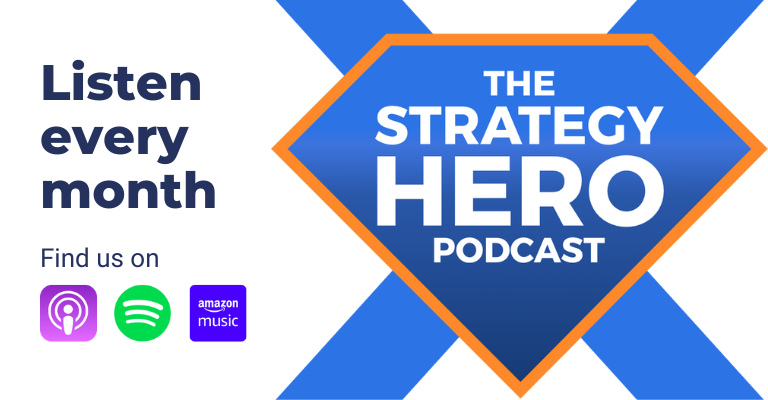How do you create strategic thinking in an organization? Here's what I learned from season two, episode three of the Strategy Hero podcast with my guest, Jeroen Kraaijenbrink.
It's a little-known fact that when it came to the first season of the Strategy Hero podcast, we looked at a whos who of guests, and one name kept popping up in our discussions - Jeroen Kraaijenbrink. But, as the first season unfolded, it felt as though Jeroen would be perfect for our sophomore effort.
From our introductory messages through to hitting record and listening back before the episode went live, here's what I learned from my time with him.
It’s important to note that my opinions do not reflect those of i-nexus or Jeroen Kraaijenbrink.
Enjoy!
Why Jeroen?
Jeroen’s background is academic, though his demeanor and mindset aren't the sort you'd associate with someone of that background.
And if that wasn't evident from reading Jeroen's content on his LinkedIn, five minutes over Zoom cemented that.
As you get to know Jeroen, you can tell why he's successful. With a strongly promising career that, halfway through, he felt wasn’t giving him a “direct, physical impact on the world" he knew he wanted to do something directly with businesses.
"I stepped out of academia with half a leg…gradually I went my way through writing, consulting, and my books."
But what's even more interesting than his switch from academia to business - which we'll talk about more in the next section - is Jeroen's social following.
It may sound like a vanity metric, but the strategy execution space is not one where you have “influencers". That means he creates a genuine connection with people just like you. Make sure you follow him!
Theory v practice
"The biggest challenge wasn’t theory v practice, but it was how I saw myself…and how others saw me."
Jeroen touched upon something that isn’t an issue exclusive to the world of strategy execution – it affects anyone who has chosen the academic route first. For Jeroen, in some countries an academic is positive, in others, it’s a negative.
"Potential clients might not see you equipped to work with real companies…my own challenges of redefining what kind of professional I was…was my main challenge."
Jeroen had strong intuitions of how things worked in reality, but he wanted to explore that in practice.
That is often a challenge you hear with consultants – they’re theoretical and the content is dense – “not aligned to what goes on in the world” as I put it.
Finding the middle ground of theory and practice is a fine line. Jeroen talked about a “liberation journey” where you challenge what’s normal in your context, and that's a great approach to take.
The world is different from the ideal state. We shouldn’t be scared to embrace our academic backgrounds, but that should be taking the best of what we’ve learned in classrooms and merging that with the realities of working on the shop floor and in our teams.
Creating order out of chaos
"I’ve never had a very clear idea of where I want to go… that [perhaps] is the whole reason I find strategy interesting because it’s all about creating that future image."
Jeroen likes creating order out of chaos and linking concepts.
It’s been a common thread through university-based research, as well as how he works with his clients. His research strengths have put him in good stead for his consulting role.
The fact that strategy is made at the highest level of a business talks to him – it’s vital to the success and growth of the organization.
As his career has developed, he's learned to follow intuition and take opportunities. With clients, that's matching your skills and resources with the opportunities you've identified. You pick the best option that you feel will best serve your customers.
To do that, I like that Jeroen creates a framework to help different parts of the business contextualize strategy. The organizational strategy is translated into sales, financial, and so on views – much like how the balanced scorecard maps a strategy according to key perspectives.
It’s equally fascinating that Jeroen takes a research approach to hear how every area of the business views what matters, and then takes this data to create.
"I see myself as a ghost-writer. I listen, I talk to people, they tell me what they think, they do that collectively…I listen very carefully and really immerse myself as if I’m the client, then structure what they have said and give it back to them."
Internal v external strategy creation
“I’m convinced that what many organizations need to develop is strategic competence. They need to be able to do it themselves."
Jeroen argues that strategy isn’t just about filling out a model. That’s what drove him to author books because there’s a knowledge gap in how they can develop the skills they need to be able to do things in-house.
To my mind, it’s hard to take concepts and apply them to your world.
It’s telling that a large number of Jeroen’s clients came from MBA classes. This tells me that Jeroen might be onto something around the gap between the classroom and the shop floor.
And the right culture?
“Too many companies after having invested a lot time and effort in the strategy formulation part become impatient, they say “now we want results."
When you go straight from a strategy to action, that’s when it fails. It’s knowing what is the difference, what needs to happen, and what it means for my department.
That’s where catchball comes into play because that is the opportunity to live what I feel is important for a strategy: “aspirational in direction, but pragmatic in how we get there.”
You cannot be realistic in how you move towards achieving your strategy without first involving teams and subject matter experts in what needs to be done.
The role of AI in strategy
Jeroen argues that AI can help with intellectual work involved in strategy execution, but like any technology, you still need a human to help inject emotion and subjectivity.
For more, please read his thoughts on LinkedIn.
My takeaway: the human-centered approach to strategy
In a yet-to-be-released episode, we talk to a Kaizen Institute legend about how critical thinking and analysis have overwhelmed strategy execution to the point of detriment.
Jeroen adds to this by saying:
“we’ve undervalued…the creative thinking that’s extremely important in strategy, but if you look at the average tool it’s very analytical…we’ve become suspicious of feelings and emotions.”
He argues that it's more important whether people believe in the strategy. If they do, it’ll most likely happen.
Too much is put into data and analysis, but emotions and conviction matter.
A good strategy by objective criteria – e.g. financials – isn’t enough. No, it's the process of working together to learn, talk, and align a future view by collecting people that is more important than any data. It is critical.
“Strategy…has a profound impact on people’s positions and relationships…so ignoring all of that is almost a guarantee for failed execution.”
His last words to leaders in the episode speak volumes: “Don’t just say it, live it.”
Thanks for being our third hero of the season, Jeroen!
Listen to the episode
Jeroen's episode was the third of season two of Strategy Hero.
You can click here to listen to Jeroen's episode, search "Strategy Hero" wherever you find your favorite podcasts, or click the play button below.
About Strategy Hero
Published on the last Thursday of every month, the Strategy Hero podcast delves into the world of business strategy and transformation.
Each cast shines a spotlight on a Strategy Hero – inspirers, boundary pushers, and leaders of change from all walks of life – armed with practical advice on achieving your goals.
Episodes explore topics around operational excellence, Lean management, process improvement, change management, and much, much more. Available where all great podcasts live, listen on-demand today, and discover the Strategy Hero inside you.
About the host
James Milsom is Head of Marketing at i-nexus, but James is a storyteller. He’s the UK’s biggest Georgia Bulldogs fan (Go Dawgs!) and lives and breathes marketing.
The Strategy Hero podcast is his opportunity to bring some of his conversations with mentors, inspirers, and people anew to you every month.
He’s behind the content read and watched by people like you and lives to educate and help others.
If you’d like to learn more about him, connect with him on LinkedIn and subscribe to the Strategy Hero podcast today!



.jpg?width=352&name=KPIs%20(3).jpg)